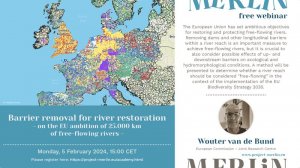
This event is the 19th webinar of the MERLIN Academy as part of the project MERLIN, the EU-funded project which aims to mainstream freshwater restoration through the concept of Nature-based solutions.
Guest speaker Wouter van de Bund from the European Commission - Joint Research Centre will present on barrier removal for river restoration in the EU.
The European Union has set ambitious objectives for restoring and protecting free-flowing rivers, addressing both longitudinal and lateral connectivity through removing barriers. European rivers are highly fragmented by on average ca. 2 longitudinal barriers each river km, while data on lateral fragmentation are still to a large extent unavailable. Removing dams and other longitudinal barriers within a river reach is an important measure to achieve free-flowing rivers, but it is crucial to also consider possible effects of up- and downstream barriers on ecological and hydromorphological condition. A method will be presented to determine whether a river reach should be considered "free-flowing” in the context of the implementation of the EU Biodiversity Strategy 2030. The proposed approach aims to ensure that key river functions, such as sediment transport, flooding of floodplains, lateral erosion, and fish mobility are not significantly impaired. The main elements of the assessment method are (1) segmentation into homogeneous reaches; (2) assessment of relevant longitudinal barriers within the reach; (3) type-specific criteria ensuring that lateral barriers are not significantly compromising river functions; (4) defining type-specific minimum lengths for a free-flowing reach; and (5) catchment scale criteria to ensure that river functions are not significantly compromised by upstream barriers for sediment, and that there are no unmitigated downstream migration barriers for target fish species. Achieving free-flowing rivers therefore requires not only the removal of barriers within the reach but also the mitigation of the effects of barriers up- and downstream, through sediment management and measures to ensure fish migration.
The webinars are open and free for anyone to join.
